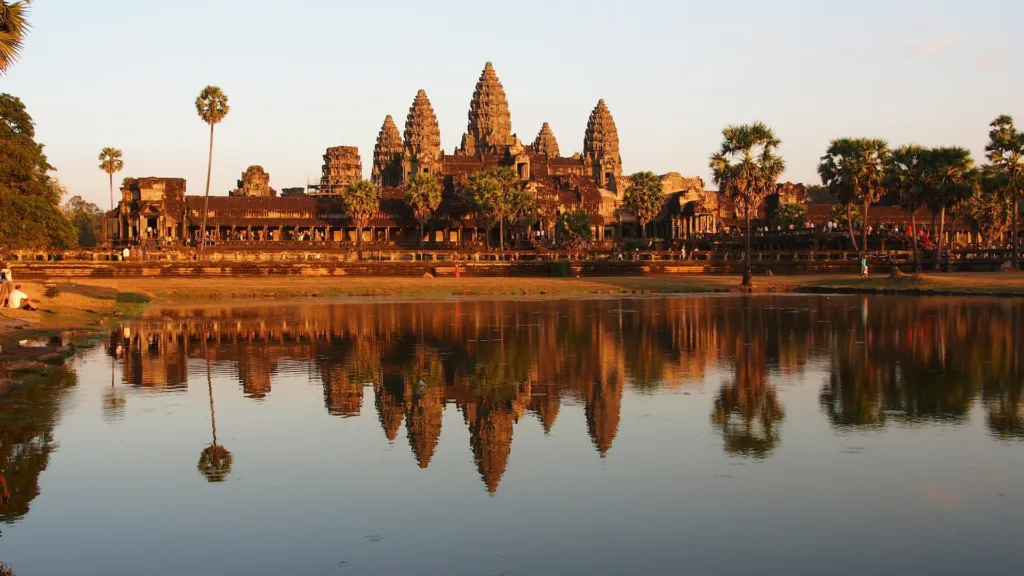The Pearl of the Far East
Vietnam’s densely packed landscape is a mixture of modern bustling cities and rugged countryside – but where’s best to start traveling Vietnam, Ho Chi Minh, or Hanoi?
Hanoi has an authentic less modern character in its intense winding streets while the warmer Ho Chi Minh has a 21st-century air-conditioned buzz and an unmissable nightlife. Both cities are urban jungles; Overhead cables are like vines winding underneath a skyline canopy of rooftop bars, penthouses, and skyscrapers.
Hanoi is the gateway to Northern Vietnam, one of the most impressive and picturesque landscapes in South East Asia. While Ho Chi Minh allows travellers to explore the cities of Dalat and Nha Trang as well as the beautiful southern tropical islands of Mong Tay, Nam Du, Gam Ghi and Phú Quôc.
The best way to travel this country is to see both, but what’s the best route to backpack around Vietnam?
Unlike the usual copy and pasted advice, we recommend Travelling from Hanoi and the North down to Ho Chi Minh in the South. The rolling rice fields of Sapa and the rugged mountains of Ha Giang in the North are undoubtedly the most impressive landscapes in Vietnam so starting here means you’ll be ever so slightly underwhelmed by the rest of Vietnam’s viewpoints. Plus the tropical resort islands and luxury, modern cities of Southern Vietnam offer a more comfortable and clean place to relax after almost 38 hours of travelling from Hanoi. Yet if you finish up in Hanoi, you will find a more basic setup, with plenty of hectic adventure but little in the way of relaxation.
No matter what your route is, if you visit the best-rate locations below, you are guaranteed to have the best road trip and backpacking experiences of your life.
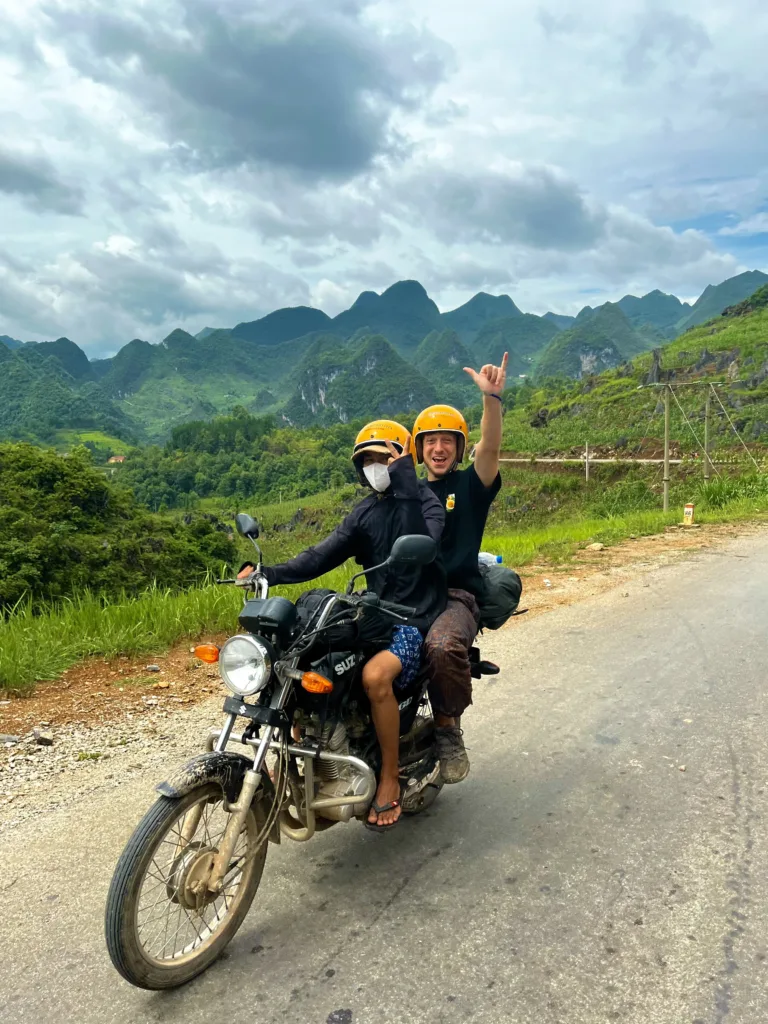
Hà Giang Loop
Asia’s most famous motorbike road trip is a must for those looking...
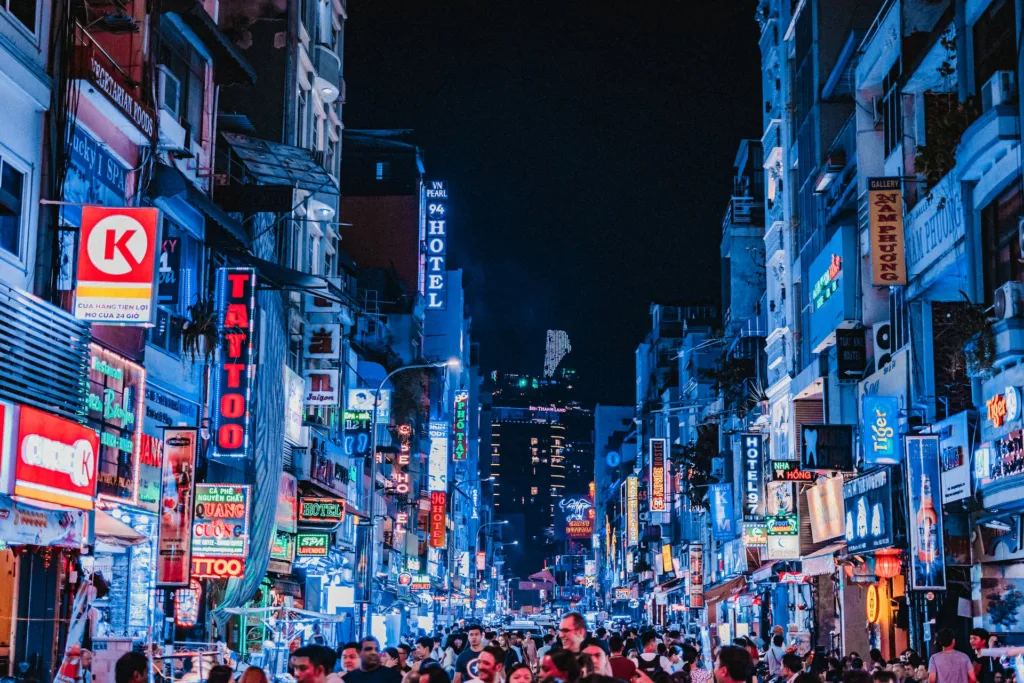
Ho Chi Minh City
Vietnam’s most populous city, Ho Chi Minh City (also known as Saigon)...
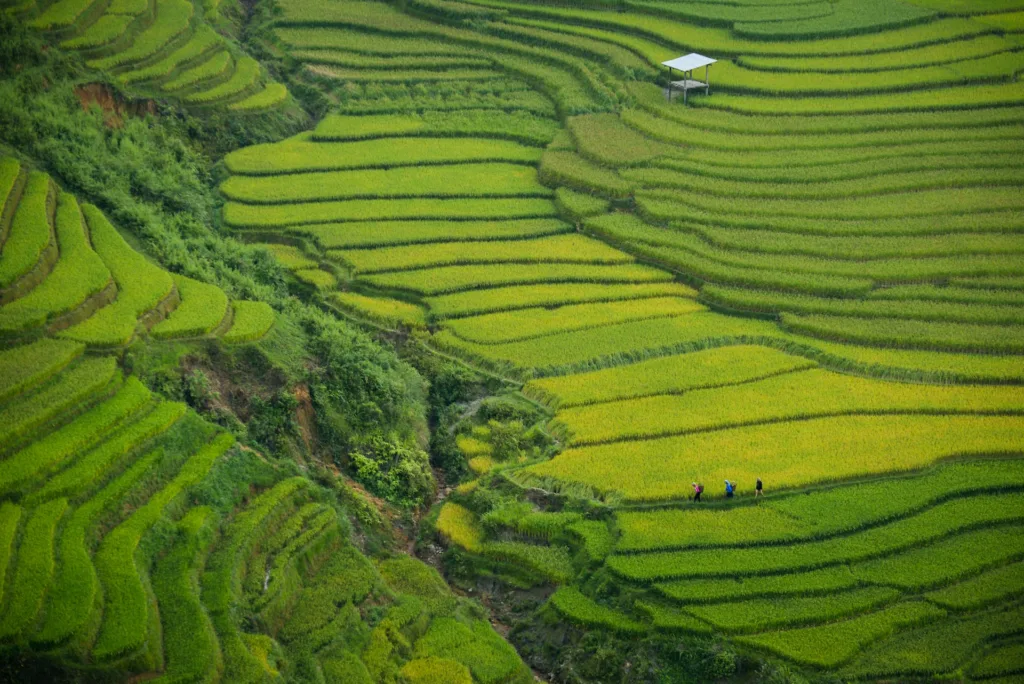
Sapa
Famed for its jaw-dropping natural beauty, this mountainous location is unmissable for...
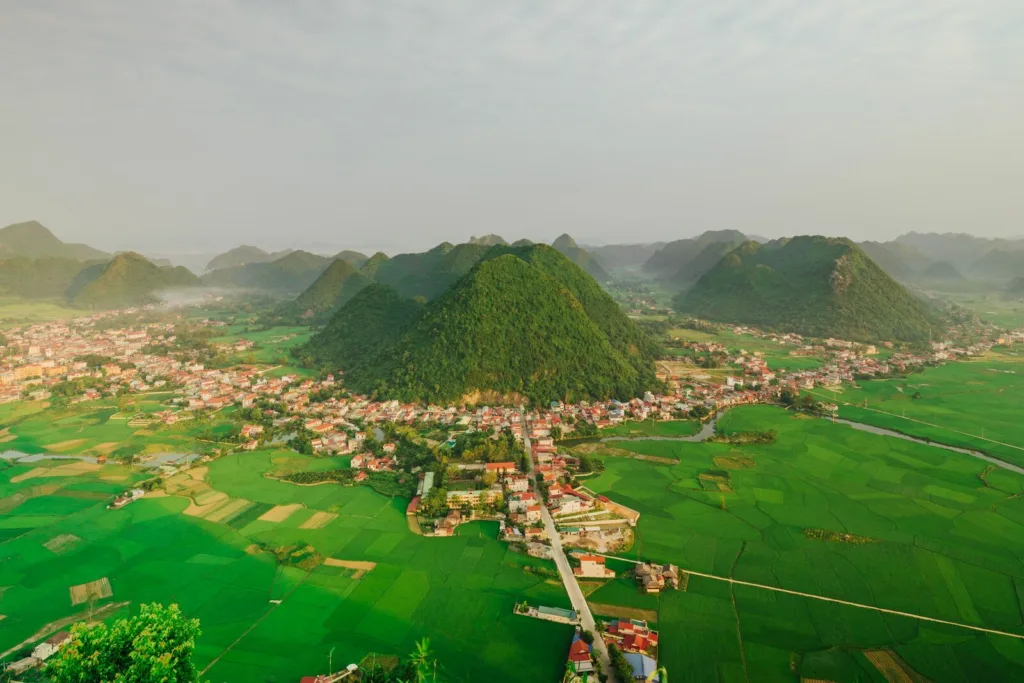
Ba Be National Park
Perhaps one of Vietnam’s most beautiful national parks, this easily accessible and...
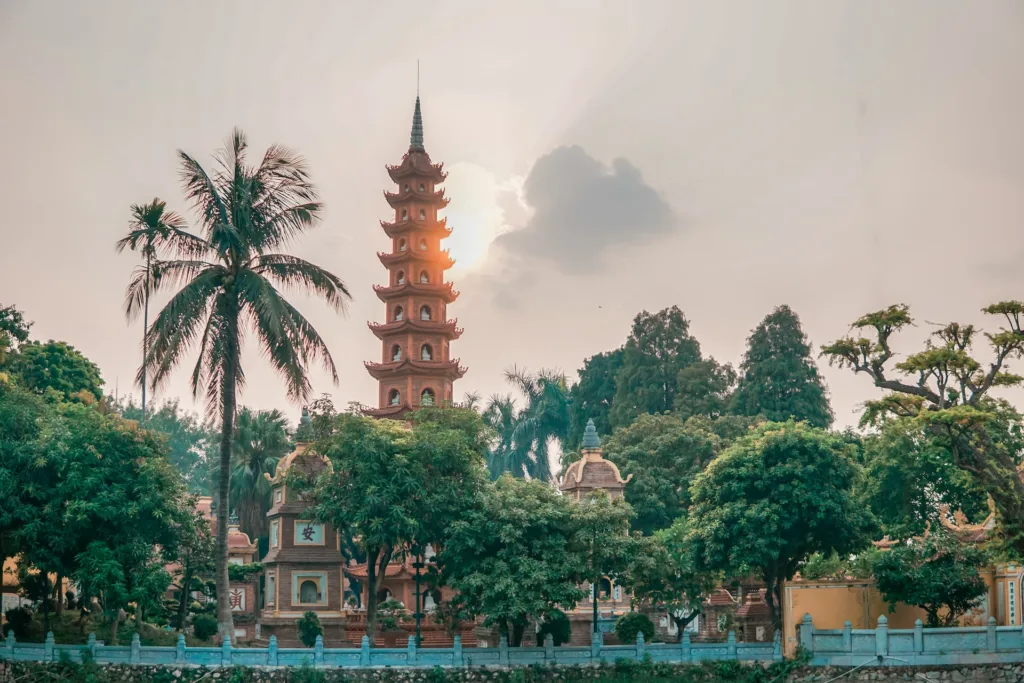
Hanoi
The capital city of Vietnam, Hanoi offers an authentic experience for travellers...
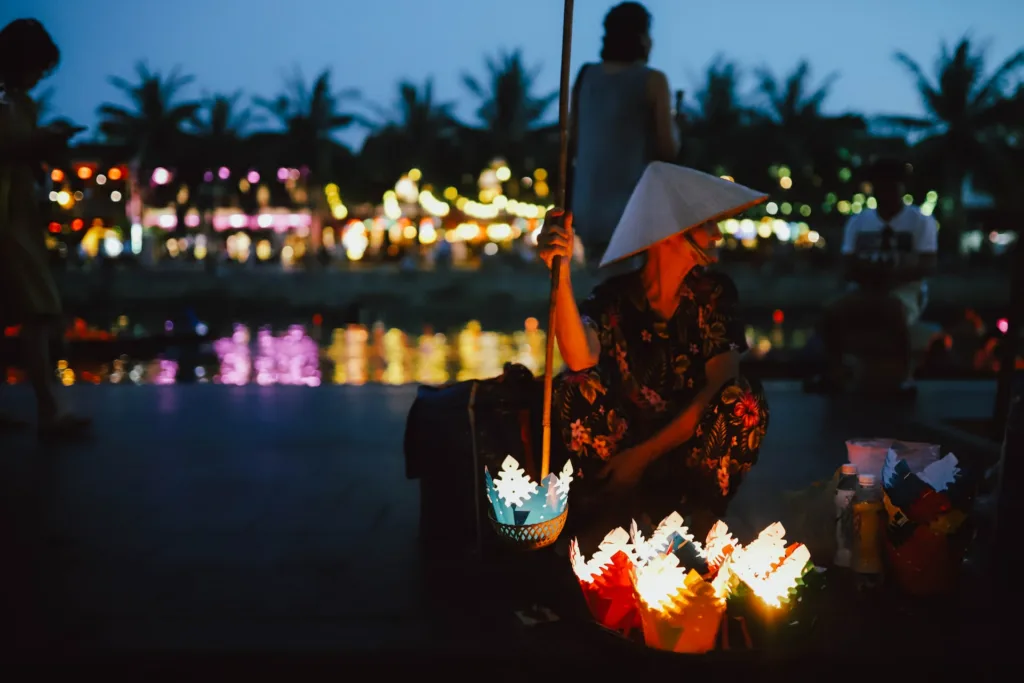
Hôi An
Known around the world for its lanterns, this ancient city has so...
Tours
The best guided tours in Vietnam:
- Spinning Basket boats – Hoi An
- Ha Giang loop – Ha Giang
- Deset Sandboarding – Dalat
- Sapa Motorbike Tour – Sapa
- Phong Nha Cave Exploration – Phong Nha
- Sapa Hiking Expedition – Sapa
- Diving Tours – Nha Trang & Ho Trau Nam
Culture
Vietnam’s culture has characteristics of Cambodian, Lao and even French influence. Yet the most significant and ever present impact on Vietnamese culture was when they were under Chinese rule for over 1000 years. Over 75% of the population follow folk traditions rather than traditional religious groups prioritising ancestral beliefs or atheism.
The Vietnamese also believe in modest tolerable behaviour , being too loud, boastful or even overly affectionate in public is often considered rude or shameful.
Activities
- Basket boats – Hoi An
- Train street – Hanoi
- Night market – Hoi An
- Taste Egg Coffee
- Bitexco Financial Tower Viewtpoint
- Hot Thom Cable Car
- Lantern Festival – Hoi An
- Phong Nha Cave – Largest Cave in the world
- Old Quater – Hanoi
- Ban Gioc Waterfall – Ba be National Park
- Desert Sandboaring – Dalat
Cuisine
Most Vietnamese food will perfectly combine fresh aromatic herbs & spices with an array locally sourced vegetables, seafood or meats. These flavours are either flash fried, blanched in a salty rich soup, wrapped in spring rolls, or steamed in buns. Strongly influenced by the cuisines of Laos, Cambodia and especially Chinese, Vietnamese cooking prioritises fresh ingredients and even has techniques used in French Cuisine.
The most popular Vietnamese dishes are:
Pho – Salty stock Broth, paired with Chicken or Beef and topped with fresh veg and a selection of herbs.
Bun Cha – Vietnamese squashed meatball & belly pork with rice noodles and herbs.
Accommodation
Best Hostels and Hotels in Vietnam
- Nexy Hostel – Old Quarter, Hanoi
- Mega View Homestay– Sapa
- Ace Home– Ho Chi Minh
- Lanchia Home-Phu Quoc
- Trang An River View Homestay– Ninh Binh
- Sun Paradise Villa– Hoi An
Nature
Bordering China, Northern Vietnam is a staggering mountainous region that is largely made up of unexplored jungle and fog covered ravines. Most travellers only see the tourist hotspots of Sapa and Ha Giang due to its isolation.
In the Northern lowlands of Vietnam is the Red River Delta a densely populated region dedicated to agriculture with very little other than acres of rice fields until you reach the outskirts of Vietnam’s capital Hanoi. Travellers heading South usually skip the North Central Coast and head straight to Da Nang or Hoi An.
The South is far flatter, warmer and is home to the Mekong River Delta which floods the lands with fertile rich soil. After 16000 miles of plains the terrain will change to the urban jungle of Ho Chi Minh and or sand dunes of Dalat.
Visas and entry requirements
Visits for up to 15 days don’t require a Visa.
30 days Vietnam E-Visa – for £25 processing fee, it takes 3 days to come through!
Local Laws and Customs
Respect for Culture: Vietnamese culture highly values respect. Showing respect to elders, modest dressing, and being mindful of local customs (like removing shoes before entering someone’s home) is appreciated.
Drug Laws: Vietnam has very strict drug laws, including severe penalties for possession or trafficking. It’s crucial to avoid any involvement with illegal drugs.
Public Behaviour: Behave modestly in public spaces. Public displays of affection should be limited, and conservative dressing is preferable, especially when visiting religious sites.
Traffic Laws: Vietnam’s traffic can be chaotic. Be cautious when crossing roads and consider hiring local transportation or using reputable services.
Cultural Sites: When visiting temples or pagodas, dress modestly (covering shoulders and knees) and follow respectful behaviour, like speaking softly and avoiding disruptive actions.
Tipping: Tipping isn’t a widespread practice, but it’s becoming more common in tourist areas. Check if service charges are included in your bill before tipping.
Safety
Vietnam is widely considered a safe destination for travellers. Scams and petty theft are the most common issue you will face here. Almost every traveller has a scam story of being charged far higher tourist prices than locals. Most theft is snatching bags, camera’s and phones so keep your valuables close.
The most common injury for backpackers in Vietnam is due to moped/scooter accidents. If you are renting a bike try and gain some experience before visiting Vietnam – the inner city roads are as crazy as Bangkok and the popular Ha Giang loop is a tricky ride.
Avoid tap water and quiet street food stalls! If the foods safe and worth eating there will be a queue.
Vaccinations
Our pharmacy travel consultant recommended :
Diphtheria, Poliomyelitis, Tetanus, Hepatitis A, Rabies, Typhoid, Cholera, Hepatitis B, Japanese Encephalitis and Yellow Fever.
Respect
Don’t cross your fingers for luck – Although this is an international symbol of good luck in Vietnam it represents a female’s genitalia and is similar to giving the middle finger!
Table Manners – Much like Japan, eating ettiquette is particularly important around highly respected or elderly individuals.
Greetings – Similar to most of South East Asia it is customary to slightly bow your head as a sign of respect when meeting new people.
No pats on the back – Patting someone on the back as a greeting is considered belittling in Vietnamese culture.
1
Emergency numbers in Vietnam?
113 for police calls, 114 for fire and 115 for ambulance.
2
Is Vietnam’s famous train street market legal?
No, the Train Street Market or Ta Hien Street is technically illegal although local authorities turn a blind eye to the businesses that operate on the tracks everyday!
Don’t let this stop you from going the street is in a state of beautiful chaos and the train coming through is an incredible spectacle.
3
Is Vietnamese egg coffee safe to drink?
Yes its completely safe to drink! While the egg whites used may contain salmonella the coffee is brewed to high temperatures which kill the bacteria. There has been no recorded Salmonella from egg coffee so enjoy the delicacy with peace of mind!
4
Can you get mobile reception in Sapa?
Yes, in Sapa town and the valley below you get reception and even 4G! Of course head further away from Sapa and into the more isolated mountainous areas and you will lose data connection. Most hotels in Sapa also offer wifi and although usually slow it is strong enough to access the internet.
5
How many people die on the Ha Giang Loop each year?
On average around 7 people die taking on the Ha Giang loop annually. This statistic may come as a shock but many routes are along narrow cliff edges and the monsoon season creates difficult driving conditions.
6
Can eating fertilised eggs give you salmonella in Vietnam?
Yes, eating fertilised eggs or Hot Vin Lon has the potential to cause Salmonella. According to the United States Food and Drug Administration, fertilised eggs or Hot Vin Lon is ‘potentially hazardous’, as the humidity and temperature of the fertilisation period increases the likelihood of Salmonella. If you are sampling this delicacy ensure it is hard-boiled for a minimum of 30 minutes and do not eat any raw yoke or egg white.
7
What is egg coffee?
The Vietnamese delicacy Egg Coffee is made with egg whites, condensed milk, sugar, and ground coffee beans.
8
Is visiting the Golden Bridge worth it?
No, it is incredibly expensive and very overpriced. For most of the year the viewpoint is entirely surrounded with fog. If you are going to visit make sure it isn’t overlapping with the school holidays as this is a hotspot for tourists.
9
Do Vietnamese dislike travellers because of the war?
No generally the Vietnamese are very welcoming towards travellers. The younger generation especially view on tourism as a way of bettering their country.
However, it is important to be aware that less than 50 years ago the Vietnam War killed 2 million Vietnamese, while 3 million were injured and another 12 million made war refugees. These atrocities are still in memory for many adult Vietnamese, so respecting the war and its casualties is very important when you’re visiting.
10
Where can I find the spinning boats?
The spinning basket boats all over TikTok and instagram are located in Hoi An, Vietnam. It costs around £4 to do and is so much fun!
Caution – it spins so fast some backpackers throw up!






